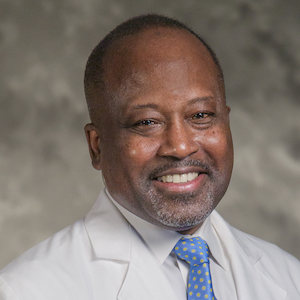Letter from the Chair — Connections Winter 2024
Dear Colleagues and Friends,

Welcome to the third quarter edition of "Connections," our Departmental newsletter. This issue spotlights the tireless efforts of our faculty and residents in building our reputation as thought leaders and researchers, providers of excellent care and advocates for healthier and more connected communities.
Inside this digital publication, you'll be introduced to the details of a clinical trial that is exploring how to reduce side effects of chemoradiation in patients with HPV-related cancers without sacrificing its therapeutic benefits, led by David M. Brizel, MD, the Leonard Prosnitz Distinguished Professor of Radiation Oncology and co-director of Duke Cancer Institute’s Head and Neck Cancer Program.
Find out how our partnership with Duke Clinical Research Institute and GlaxoSmithKline is enabling us to conduct the first quantitative patient preference study in the field of rhinology, which is related to the management of recurrent nasal polyps using new biologic medications. This study examines what patients value as they choose between standard therapy and a viable alternative to revision sinus surgery, and supports our efforts to empower patients to participate in management decisions that impact their own care.
Read about how Dr. Eliades and his group are working to learn more about a foundational piece of knowledge that could someday help to improve therapies for people with certain types of speech and language disorders. The group also has begun some brain-related marmoset studies that could lead to a better understanding of stroke-related communication disorders.
Walter Lee, MD, Chief of the Division of Head and Neck Surgery, has led the development of a low-cost nasopharyngoscope, the ENLYT, with Duke engineering students, in partnership with Vivo Surgical based in Singapore. ENLYT is a low-cost alternative to standard endoscopes which are inaccessible due to high costs. This new instruments promises to make early endoscopic diagnosis of throat cancers more widely accessible in resource-constrained countries.
Hear from Patrick Warutere, an immigrant pastor of North Raleigh International Baptist Church (NRIBC), whose members encounter barriers to healthcare including language barriers and a fragile impression of the medical community. He is partnering with our department to bring awareness, education and access to screening for head and neck cancers to his local community, with the hope of building relationships and trust between his community and Duke Health.
And lastly, read about Dale Jessup’s partial laryngectomy that allowed him to keep his voice whereas other treatment options for throat cancer were going to take it away.
This quarter’s edition is full of hope for the continuous improvement of our ability to help patients and communities achieve better health outcomes, communication function, and connection. As we approach our fifth year as the department of Head and Neck Surgery & Communication Sciences, we remain committed to continuously building our capacity and reputation for delivering innovative and compassionate care with impact locally, nationally and internationally.
Thank you for following our journey.
Sincerely,
Howard W. Francis, MD, MBA, FACS
Richard Hall Chaney, Sr. Distinguished Professor of Otolaryngology
Chair, Department of Head and Neck Surgery & Communication Sciences
Chief of Medical Staff, Duke University Hospital